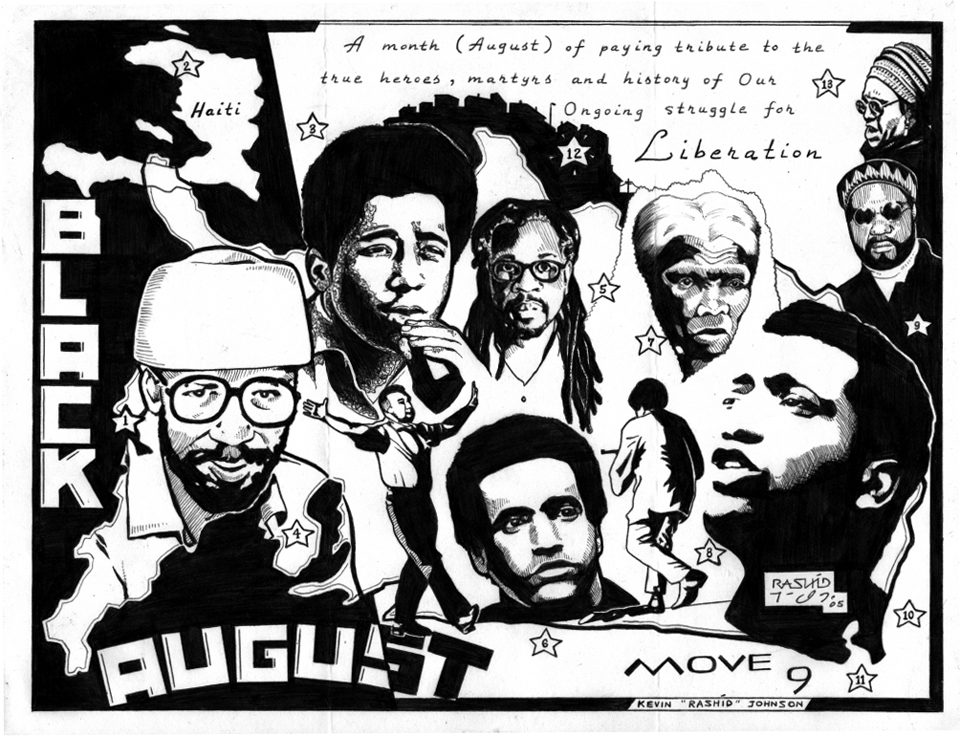51 years ago, a 17-year old brought 3 guns into the Marin County Courthouse on August 7, 1970 in a bold act of resistance. With the assistance of three prisoners, James McClain, Ruchell Magee, and William A Christmas, Jonathan Peter Jackson took a judge, a deputy district attorney, and three jurors hostage in exchange for the freedom of the Soledad Brothers—3 Black prisoners charged with the murder of killing a prison guard at Soledad State Prison—including Jonathan’s older brother George Jackson, Fleeta Drumgo, and John Clutchette. Jonathan was gunned down by the state.
This same month a year later, George Jackson was assassinated on August 21, 1971 by prison guards during a prisoner rebellion, and our movement lost one of our most brilliant minds and disciplined revolutionary leaders.
Years later, prisoners began celebrating Black August by wearing black armbands and studying events of Black insurgency and liberation to honor Jonathan’s sacrifice in the Marin County shootout, the Soledad Brothers, other political prisoners and freedom fighters. Between sun up and sun down, prisoners began fasting and exercising self-discipline for the entire month to recognize the sacrifice given to and needed for Black Liberation. Overflowing with history of Black-led resistance and insurgency, the month of August holds countless lessons of liberation from the Nat Turner Rebellion, to start of the Haitian Revolution and the abolition of slavery in Jamaica, to the Fugitive Slave Law Convention and the foundation of the Underground Railroad to the Brotherhood of Sleeping Car Porters, from the March on Washington to the Watts Uprising, to the arrest of Nelson Mandela, to the Fergusson Rebellion, as well as the births of Marcus Garvey, Russell Maroon Shoatz, Fred Hampton and James Baldwin and the deaths of W.E.B du Bois and the Jackson brothers, and more.

For many prison industrial complex (PIC) abolitionists, George Jackson is not only a source of inspiration, discipline, and strength, but a symbol of resistance to the violence of the prison industrial complex and the revolutionary potential of all prisoners. George was originally arrested after being accused of stealing $70 from a gas station as a teenager and instead of being imprisoned for a few months in county jail, was caged in state prison for an indeterminate sentence of one year to life. Tortured for seven and half years in solitary confinement, George transformed himself into a revolutionary leader of the Black Power movement developing much of the undying anti-fascist, anti-capitalist, and internationalist analysis and commitments of the PIC abolitionist movement today.
 A model leader in the principles of unity, physical and intellectual training and resistance, political education, and self-sacrifice (as described by San Quentin Six Sundiata Tate), George Jackson’s scathing political analysis and guidance stands needed today.
A model leader in the principles of unity, physical and intellectual training and resistance, political education, and self-sacrifice (as described by San Quentin Six Sundiata Tate), George Jackson’s scathing political analysis and guidance stands needed today.
This Black August many movement organizations and organizers inside and outside of prisons have shared Black Liberation resources for study and reflection all month long. Check out this inspired new project by The Freedom Archives, “99 Books,” an archival website honoring the 50th anniversary of George Jackson’s death, based on the 99 books found in his cell after he was assassinated.
During this year of pitched collective grief, trauma, anxiety, mass death, righteous rage, and global crisis, we pause to wonder: If George were still here, what would he say? How would he lead? How would he model unity, self-sacrifice, and discipline for us now? As this Black August continues, Critical Resistance forges ahead with our work generating political education and movement resources for abolition inside and outside of prisons, building off our organizing to close prisons across California and our organizing to end ICE detention in New York, while fighting to defund and dismantle policing in Oakland and Portland. As we move through this month of study and reflection, we want to uplift the roots of Black August originating from prisoner resistance and honor the sacrifice prisoners have made for all of our movements.
Let us, whether we are meeting this moment by supporting mutual aid efforts to support people get basic needs met during the COVID crisis, fighting for public health or housing for all, organizing to defund police departments, standing in solidarity with Palestine or the Philippines against colonization and imperialism, hustling to provide quality education during the nearly impossible conditions of the pandemic , or grinding to save the planet from climate disaster—recognize the interconnectedness of our struggles and the centrality of prisoners in generating the strategies, tactics, analyses and sacrifices we use in each fight we wage.
